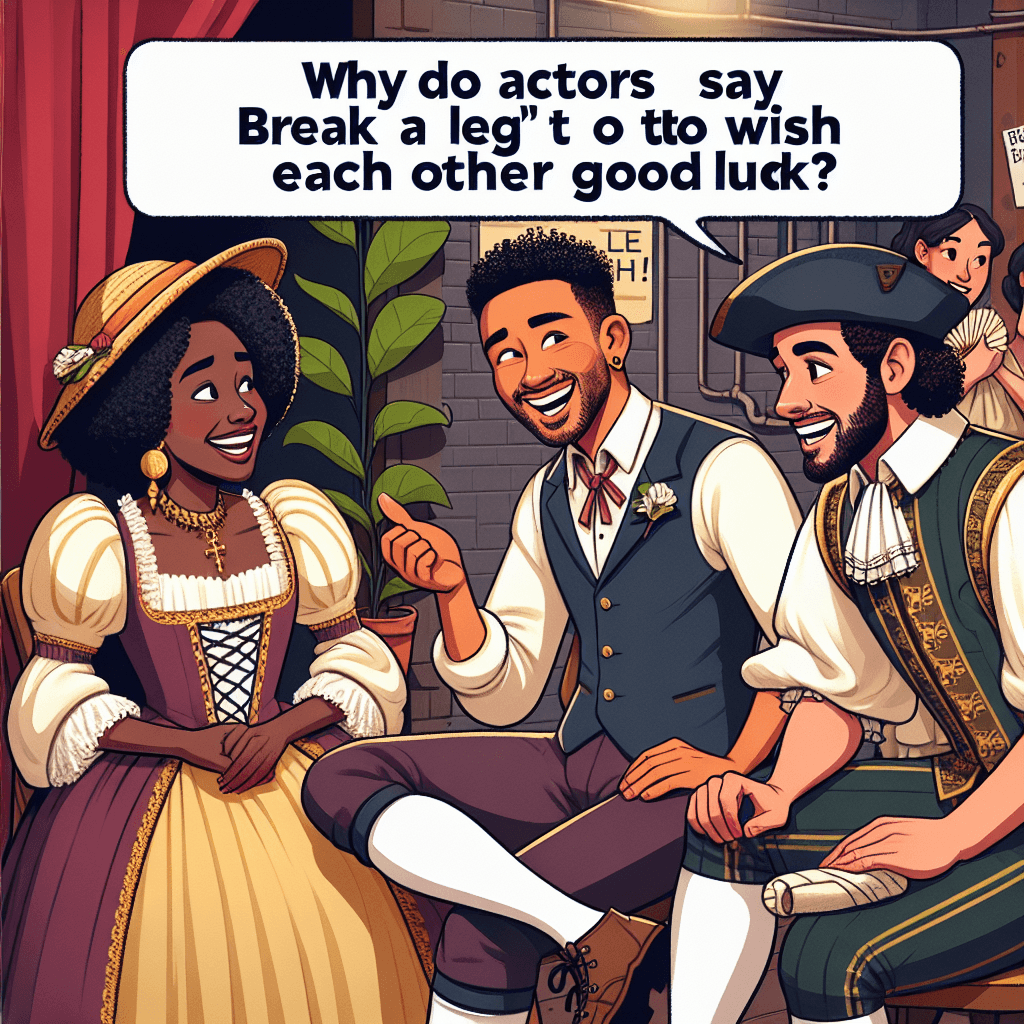Why do actors say break a leg to wish each other good luck
In the superstitious world of theatre, the worst thing you can say is "good luck." Uncover the bizarre and fascinating history of why actors wish each other a painful injury for a stellar performance instead.


Too Long; Didn't Read
TLDR: Actors say break a leg due to superstition; saying good luck is considered bad luck in theater. Wishing for the opposite is meant to trick fate into giving a good performance. Other theories link it to an actor bending their knee to bow or getting paid in vaudeville.
Never Say 'Good Luck': Why Do Actors Say Break a Leg to Wish Each Other Good Luck?
Imagine telling a marathon runner to "break a leg" right before a race. It sounds like a curse, not a wish for success. Yet, in the hallowed halls of theaters worldwide, this peculiar phrase is the ultimate expression of support. Saying the seemingly simple and kind "good luck" backstage is considered a major taboo, capable of cursing a performance. This deeply ingrained superstition has puzzled audiences for generations, begging the question: Why on earth do actors wish each other harm as a sign of goodwill? This post will delve into the fascinating and debated history behind this iconic theatrical tradition, exploring the most popular theories that attempt to unravel the mystery.
The Most Popular Theories Behind "Break a Leg"
While no single origin story is universally accepted, several compelling theories have emerged from theatrical folklore, history, and superstition. Each offers a unique glimpse into the mindset of performers throughout the ages.
The Fear of Jinxing: Outsmarting Mischievous Spirits
One of the oldest and most widespread theories is rooted in pure superstition. For centuries, performers have believed that mischievous spirits or gremlins inhabit theaters, delighting in causing chaos. According to this belief, directly wishing for a good outcome (e.g., "good luck!") would tempt these spirits to do the exact opposite, leading to forgotten lines, missed cues, or collapsing sets.
To counteract this, actors developed a form of reverse psychology. By wishing for something terrible to happen—like a broken leg—they hoped to fool the spirits into granting them good fortune instead. It’s a classic case of tempting fate by pretending to want the worst.
A Nod to the Elizabethan Stage?
Another theory takes us back to the era of Shakespeare. In Elizabethan England, it was common for appreciative audiences to throw money onto the stage for a performance they enjoyed. To collect their earnings, actors would have to bend down or bow, thus "breaking" the straight line of their leg. Wishing an actor to "break a leg" was, therefore, a wish for them to give such a spectacular performance that they would have to bow many times to collect a stage full of coins. It was a coded way of saying, "I hope you are so successful you get paid handsomely."
The Vaudeville Circuit: Crossing the "Leg Line"
Perhaps the most practical and widely cited explanation comes from the American Vaudeville era. In these variety shows, performers were often not guaranteed payment just for showing up. They would wait backstage for their turn, and a show could be cut short or acts rearranged at a moment's notice.
The curtains on the side of the stage are known as "legs." To get on stage and into the spotlight, a performer had to cross the line of these curtains—or "break the leg line." Only the performers who made it on stage were paid. Therefore, telling a fellow actor to "break a leg" was a genuine wish for them to get their chance to perform and, most importantly, get paid for their work.
Common Myths to Dispel
Over the years, a few incorrect theories have also circulated.
- The John Wilkes Booth Myth: One popular but false story claims the phrase originated after actor John Wilkes Booth broke his leg when he leaped from the presidential box after assassinating Abraham Lincoln. However, historical records show the phrase didn't enter common theatrical use until the early 20th century, long after the 1865 assassination.
- The Understudy Theory: A more cynical (and less likely) theory suggests that an ambitious understudy might wish for the lead actor to literally break their leg, giving them a chance to take over the role. While it speaks to the competitive nature of theater, it's generally considered more of a dark joke than a true origin.
Conclusion: A Tradition of Solidarity
While the true origin of "break a leg" may forever be lost to a mix of history and folklore, its meaning today is crystal clear. Whether it was born from a desire to trick spirits, a hope for financial success, or a practical Vaudeville term, the phrase has evolved into a powerful symbol of camaraderie within the theatrical community. It’s a shared piece of code, a nod to the strange and superstitious world of the stage that binds performers together. So, the next time you hear someone say "break a leg" to an actor, you'll know it's not a threat but the most sincere and traditional wish for a brilliant performance.


